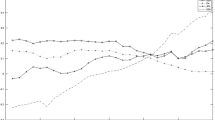Abstract
In this study, we propose a non-linear model for explaining the relationship between the dependent and the independent variables beyond the conditional mean. We extend the kink approach to expectile regression thus the model provides a more flexible means to explain the non-linear relationship in the model across different expectile indices. We also introduce the sup-F statistic test for the existence of kink effect in each expectile. The simulation and application studies are also proposed to examine the performance of our model. We apply our methodology to study the input factor affecting service sector growth in Asian economy. The use of this model allows us to identify and explore the non-linear labour effect on the service output. We can find both labour effect and kink effect present over a range of expectiles in the service output in this application.
Access this chapter
Tax calculation will be finalised at checkout
Purchases are for personal use only
Similar content being viewed by others
References
Aigner, D.J., Amemiya, T., Poirier, D.J.: On the estimation of production frontiers: maximum likelihood estimation of the parameters of a discontinuous density function. Int. Econ. Rev. 17, 377–396 (1976)
Gordon, R.: Is there a tradeoff between unemployment and productivity growth in unemployment policy? In: Snowereds, D., de la Dehese, G. (eds.) Unemployment Policy. Cambridge University Press, Cambridge (1997)
Hansen, B.E.: Regression kink with an unknown threshold. J. Bus. Econ. Stat. 35(2), 228–240 (2017)
Kim, M., Lee, S.: Nonlinear expectile regression with application to value at-risk and expected shortfall estimation. Comput. Stat. Data Anal. 94, 1–19 (2016)
Koenker, R.: When are expectiles percentiles? (solution). Econ. Theor. 9(03), 526–527 (1993)
Schnabel, S., Eilers, P.: Optimal expectile smoothing. Comput. Stat. Data Anal. 53, 4168–4177 (2009)
Sobotka, F., Kneib, T.: Geoadditive expectile regression. Comput. Stat. Data Anal. 56, 755–767 (2012)
Newey, W., Powell, J.: Asymmetric least squares estimation and testing. Econometrica 55, 819–847 (1987)
Schnabel, S.K., Eilers, P.H.: Optimal expectile smoothing. Comput. Stat. Data Anal. 53, 4168–4177 (2009)
Pastpipatkul, P., Maneejuk, P., Sriboonchitta, S.: Testing the validity of economic growth theories using copula-based seemingly unrelated quantile kink regression. In: Robustness in Econometrics, pp. 523–541. Springer International Publishing (2017)
Sriboochitta, S., Yamaka, W., Maneejuk, P., Pastpipatkul, P.: A generalized information theoretical approach to non-linear time series model. In: Robustness in Econometrics, pp. 333–348. Springer International Publishing (2017)
Tong, H.: On a threshold model. In: Chen, C.H. (ed.) Pattern Recognition and Signal Processing, pp. 575–586. Sijthoff and Noordhoff, Amsterdam (1978)
Tong, H.: Threshold Models in Nonlinear Time Series Analysis. Lecture Notes in Statistics. Springer, New York (1983)
Xing, J.J., Qian, X.Y.: Bayesian expectile regression with asymmetric normal distribution. Commun. Stat. Theor. Methods 46(9), 4545–4555 (2017)
Yao, Q., Tong, H.: Asymmetric least squares regression estimation: a nonparametric approach. J. Nonparametric Stat. 6(2–3), 273–292 (1996)
Zhang, F., Li, Q.: A Continuous Threshold Expectile Model. arXiv preprint arXiv:1611.02609 (2016)
Author information
Authors and Affiliations
Corresponding author
Editor information
Editors and Affiliations
Rights and permissions
Copyright information
© 2018 Springer International Publishing AG
About this paper
Cite this paper
Pipitpojanakarn, V., Maneejuk, P., Yamaka, W., Sriboonchitta, S. (2018). Expectile Kink Regression: An Application to Service Sector Output. In: Anh, L., Dong, L., Kreinovich, V., Thach, N. (eds) Econometrics for Financial Applications. ECONVN 2018. Studies in Computational Intelligence, vol 760. Springer, Cham. https://doi.org/10.1007/978-3-319-73150-6_63
Download citation
DOI: https://doi.org/10.1007/978-3-319-73150-6_63
Published:
Publisher Name: Springer, Cham
Print ISBN: 978-3-319-73149-0
Online ISBN: 978-3-319-73150-6
eBook Packages: EngineeringEngineering (R0)



